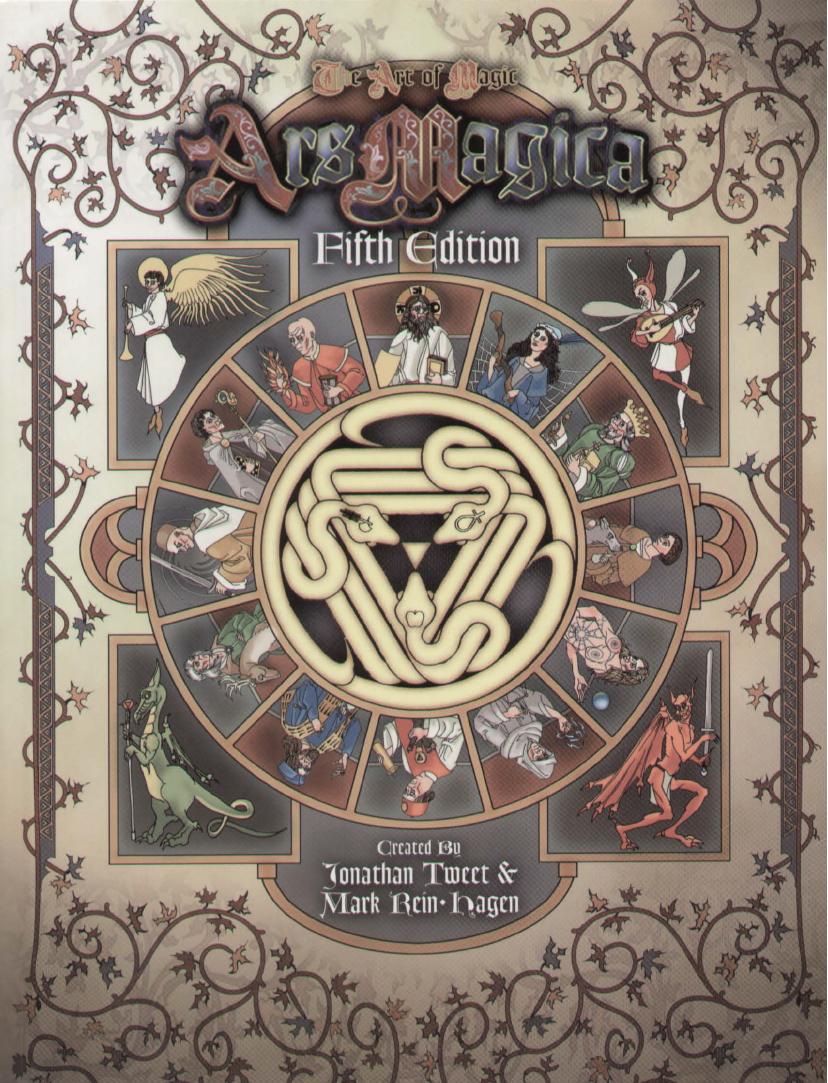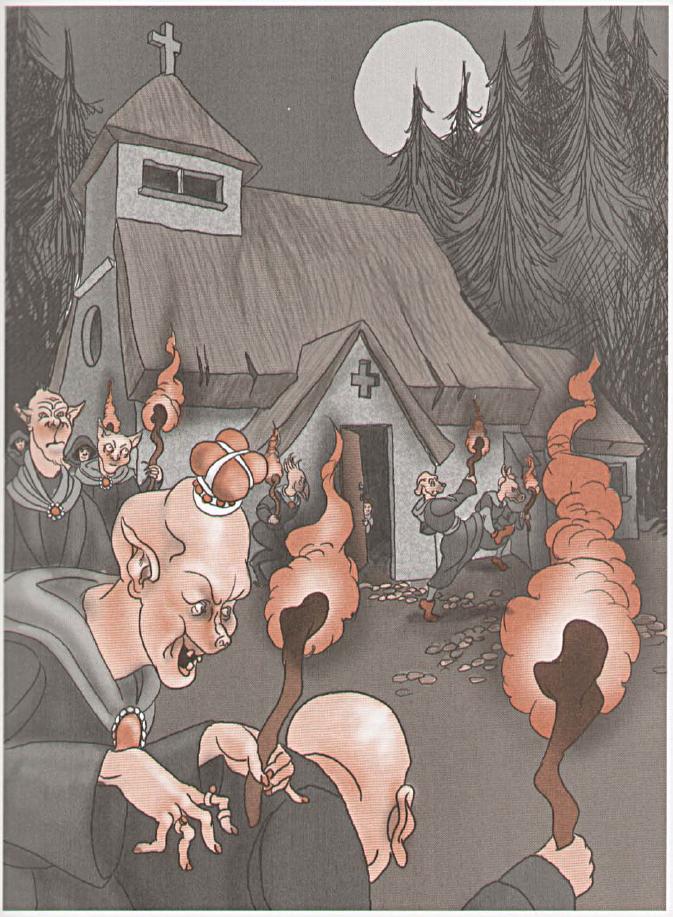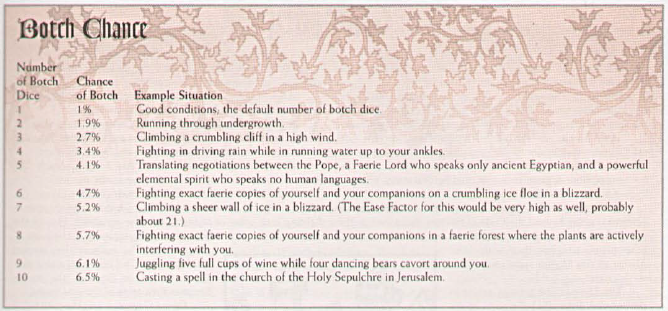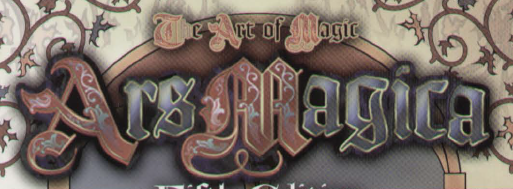Ars Magica by PurpleXVI
History
Original SA post Ars Magicka!
So, AM, an interesting game with some interesting and novel mechanics. Anyone blazing through it and glancing right at the magic mechanics will probably notice some at least superficial similarities to oWoD's Mage, and there's a reason for that, which I'll take a quick poke at before getting into the game in any way.
History of Ars Magicka
(ganked straight from Wikipedia because I'm lazy and always get it slightly wrong when I try to remember it)
Wikipedia Says posted:
The first two editions were published by Lion Rampant Games. In 1991, Lion Rampant merged with White Wolf Magazine to form White Wolf Game Studio. White Wolf published the 3rd edition, which greatly expanded the settings and peripheral rules while leaving the core system intact. White Wolf also published many supplements, detailing specific regions of Europe, or outlining stories that could be played in the original setting. Ars Magica was later sold to Wizards of the Coast in 1994, who produced several supplements, but just before publishing a 4th edition sold the rights to Atlas Games. Atlas published the fourth and fifth editions, and new source-books and supplements.
...
Many characteristics of the later Storyteller system developed by White Wolf can be traced to Ars Magica and the fact that the Storyteller system was developed by one of Ars Magica's co-authors; White Wolf's Mage: The Ascension was envisioned as "Ars Magica in the Modern World," and many of the changes in Ars Magica's 3rd edition were introduced in order to make the game-worlds more compatible.
Thankfully, by this point, Ars Magicka has nothing to do with the Storyteller System.
Introduction
Appropriately, the first chapter of the book is called Introduction, and it starts off with some Chapter Fiction where some dude is in a village being attacked by "faeries," though we're not so much dealing with little winged pretty things here, as we are with Ye Olde Kinda-Elfy Fae, who ride burning horses and are out to fuck things up. Guy gets stuck in something while everyone else runs for the church, but then a witch shows up and tells the faeries to fuck off. Exciting .
The introduction clues us in on the setting: We're in Europe roughly around 1220 and things are indistinguishable from the real world except that Faeries, Dragons, Angels, Wizards, Demons and other mystical things are entirely real and often belligerent.
Ego! posted:
Ars Magicka is a game about magic, and its rules for magic are widely regarded as the best in any roleplaying game.
So at least we know exactly how awesome the developers think they are. I guess we're going to find out if they're right or if they're just big-headed fucksticks. It also has a couple of mechanics that they consider to be "unique," one being that they've made no attempt at game balance: A wizard will always be more awesome than a non-wizard, the other being that everyone controls multiple characters.

How does that little crown even stay on his ugly head?
We're also introduced to the basic mechanic in this first chapter, which is nice of them, because I can remember multiple games that didn't actually explain this shit to us in the necessary level of detail until we were halfway through the book and, often, knee deep in chargen. To summarize:
1d10+Stat+Skill vs TN.
The average TN is 9, so we're basically using Unisystem, except the authors managed to wrap this up in a few paragraphs of overly verbose shit. They also glued on another couple of mechanics to complicate things. Firstly, Stress Dice: If we're doing something in a dangerous or stressful situation, a 10 is a botch and a 1 is a critical success. Note that despite telling us 0's on the d10 are always treated as 10's, they keep referring to them as 0's.
If we roll a 1: Roll again, if we get another 1, roll again, and so onwards. If we get two 1's in a row, any non-1 result beyond that is doubled. If we get three, it's quadrupled. If we get four, it's octupled, and so onwards, if I'm reading this right.
Also I'd like to point out that 10's as botches is weird since 10's are the best we can roll, while 1 is the worst and... it seems ass-backwards. But anyway, if we roll a 10: Roll an arbitrary number of extra d10's, if any of them come up as a 10, you have critfailed. Oh and when we botch, despite having rolled a 10, our result is a dead 0. And even if we don't critfail, in this stressful situation our formerly awesome 10 still counts as a zero, so only our stat+ability counts.
It's also completely arbitrary and up to the GM when we're stressed enough that the mechanics flip around to work this way.
After those mechanics I'm really looking forward to the fluff, which we're getting started on when I make the next post.
EDIT, just looked at the botch table in detail and it's FUCKING STUPID.

Note: You're more likely to critfail, and apparently hence more stressed, if you're juggling while bears dance near you, than if you're fighting YOUR OWN CLONES in a variety of horrible situations.
The Order of Hermes
Original SA post Ars Magica
Chapter 2: The Order of Hermes
This is the main fluff chapter, and this is where it becomes really obvious that this game passed through White Wolf's hands at some point. Instead of telling us about the state of things as they are, roughly half the chapter's a careful explanation of who stepped on whose toes five-hundred years ago and name-dropping a bunch of lost
But the general gist of it is: Wizards are asshats, Wizards spend a lot of time blowing each other up and being paranoid, some wizards figure out how to defend against magic, start working together because backstabbing becomes more difficult, blow up all the wizards they don't like.
(This isn't explained until later, but, basically, if you have THE GIFT which lets you do magic, everyone is envious and suspicious of you, just like the filthy MUNDANES they are. The magic defenses that the Order of Hermes figured out, also blocks the ENVY AURA from making them want to stab each other in the ear all the time.)
So, for the record here, you're a member of the "blow up all the other wizards"-group. Like, rather than being the plucky underdog or a member of some sort of beneficient society, you're instead a member of a group that has a monopoly on defensive magic, blows up anyone who appears to be figuring it out for themselves, blows up anyone who won't join them, considers "mundanes" to be lower than dirt and generally are kind of jackasses. There's also a huge list of rules to follow for being in the Order of Hermes... instantly followed by a list of how everyone usually breaks those rules while in the Order of Hermes.
The Twelve Houses themselves are frankly not all that interesting, you've got your druidy fuckers, your destructive dudes, your meditative-and-contemplative fellows, wizards who like fire, wizard inquisitors who makes sure no one cuts deals with demons, yadda yadda yadda. Oh right, and as a leftover from the days when White Wolf owned AM, there's also a House Tremere. About the closest thing they get to interesting are House Jerbiton who are noteworthy for not being cunts to the non-magical, and House Mercere who are the Order's messengers and also consider a bunch of non-wizardy folks to be their equals.
The rules you're supposed to follow can basically be summed up as such: Don't overturn mundane society by fucking with them, don't work for mundanes, don't give magical items to mundanes, you have to give a month's advance warning if declaring a feud with another wizard, you're not allowed to fuck with another wizard's wizarding stuff(either the Gift that lets him cast spells in the first place or his wizardy gear), you're not allowed to spy on other wizards, absolutely no fucking deals with demons ever and "Molesting the Faeries" is also discouraged(by this is meant: "Don't mug elves" not "don't rape pixies," despite the goofy wording.).
And the chapter ends with telling us how wizards get along with the various other residents of Mythic Europe.
Peasants : Distrust wizards, sometime seek refuge with them if they don't fit into society otherwise(female warriors is given as an example).
The Church : Pretends wizards don't exist as long as they don't fuck with mundane society, peaceful cooperation most of the time, tacit understanding that the Church could wreck the wizards' shit effortlessly because God has their back.
Nobles : Hello we will trade you gold for fireballs.
Non-Hermes Wizards : If the Order of Hermes can't recruit them, or if they seem to be figuring out the defenses that will let them block magical attacks and play nice with other wizards, go set them on fire.
Chapter 3: Characters
There are three kinds of characters. Magi, Companions and Grogs. Magi are our main characters, the doubtlessly-most-powerful, the wizards. Companions are non-Wizardy(but potentially otherwise supernatural) members of the Covenant(this game's word for a party of characters), each player has at least one Companion and one Magi character. Grogs are one-sentence-description mundanes, craftsmen, warriors and whatnot, whom the players are highly encouraged to treat as completely disposable, to throw to death for laughs and otherwise treat as dirt.
Honestly it might normally not weird me out, but reading it so closely after WGA's wanton creepiness towards mundane humanity, it feels a bit odd. Also, remember how it explicitly says that Magi are FAR more powerful than Companions? And how everyone has both a Companion and a Magi character to play? The game states that your Companion and Magi should never be on stage at the same time, rather, the players should make Companions who escort other players' Magi around. So enjoy being the third wheel who has far less points and abilities if you ever decide to bring out your Companion.
Then we get to the system parts. The important chunks to note down about a character are: Size, Virtues/Flaws, Characteristics, Abilities, Personality Traits, Reputations and Confidence.
Size is practically all the same for humans, so we don't give a damn about that. Virtues and Flaws are the same merits/flaws things we've had in every system. Characteristics are our basic stats: Intelligence, Perception, Strength, Stamina, Presence, Communication, Dexterity and Quickness(I have to say that splitting agility into Dexterity and Quickness seems like a good idea to avoid the usual "Dexterity is the main important stat"-syndrome that a lot of games have). Abilities are our skills and knowledges. Personality Traits don't matter much for Magi and Companions, but are one of the main things for Grogs since no one "owns" those characters and just about anyone could want to use them for a scene or something, so it's important to remember if this guy is brave, or a coward or what he is. Reputation speaks for itself and Confidence is basically the local equivalent of Fate Points, something that Companion/Magi PC's and important NPC's can burn for boosts.
Then we're given a handy list of things we should remember to note down for a character which... runs to about a dozen more points than the ones covered so far, including things we're told will only be described what are once we hit page 170(we're currently on page 20 and the bulk of the book until then is pure crunch).
After that, a bunch of Grog templates, so we can just pick up a handful of generic soldiers and the like to throw to their deaths, very handy, though I question why they list the least important characters and their creation before the most important characters. Despite being little throwaway dudes, each Grog also has a list of a dozen skills or more and I can only imagine that if the players insist on having their swarms of Grogs fighting alongside them, combat will grind to a creaking, screaming halt(though the GM is encouraged to just "decide what happens" to Grogs, so he may just shrug and say they all get killed if the players try this).
Next follow templates for both Magi and Companions, just in case we can't be fucked to actually make characters. I suspect that pretty much everyone will skip past those and just make their characters from scratch, though, because who the hell wants their core character to be a fucking faceless template?
When making characters from scratch, it follows a pattern where you give your characters skills for each point in their lives, like, there's an "early life" point pool, a "later life" point pool, an "apprenticeship" point pool for Magi, etc. and ultimately it's very nice but doesn't really affect that much, they could just have given us the damn points as a single lump and been less verbose about it. Again we are here, on page 20, asked to choose things(Houses) with effects that aren't described at all until later(page 90-something), just name-dropped. Most do not exactly have descriptive names either, just stuff like "The Enigma."
There are also some advantages and disadvantages here which already obviously destabilize the game completely between Companions. Poor and Wealthy. If you're Poor, you get 1/3rd less starting XP to make your character with, if you're Wealthy you get 1/3rd more . Assuming equal starting ages for all characters(since you get starting XP based directly on the age of your character, they should probably be the same damn age), a Poor character will be crippled and a Wealthy Companion will have almost as much XP to spend as a Magi. Also, we're told that we must make "see if you die of old age"-rolls for any character that starts age 35 or older. Also unlike other games, aging doesn't improve you in any way with regards to intelligence or wisdom(though you do get more XP for more years), so playing an older character is pretty much pure drawback.
So after getting all the numbers we need to make a character we're still... some 30 pages of Virtues/Flaws and 8 pages of abilities away from actually being done with the basics for a Companion or Grog. Add to that another 75+ pages of magic-related stuff for a Magi. Nonetheless, the authors decided to make an example character right here for the end of the chapter. Which includes loading him up with all the stuff we haven't had properly explained yet, like Virtues and Flaws, and breaking their own recommendations by making him be in his late 80's and hence risking multiple roll-for-death-by-aging rolls.
Hence, he has a massively inflated XP total and has completely bucked the odds(by having zero aging despite so many years), meaning that he in no way serves as a decent example for most players' PC's, especially as it's recommended that for first-time players(the ones who need the examples), they start off being straight out of their apprenticeship.
Good thing the magic system is, sort of, worth it. Right?